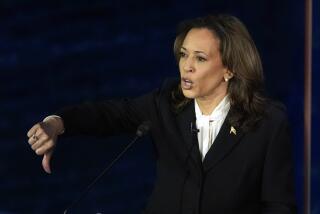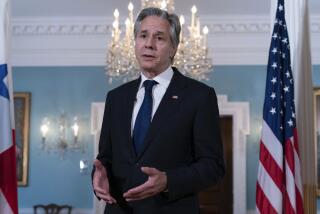Bush to Offer Poland Economic Aid During Visit : Says He Will Insist That Warsaw Makes Certain That Money Is Well Spent
- Share via
WASHINGTON — President Bush, praising Poland for holding Eastern Europe’s freest elections and for giving the country’s beleaguered economy an injection of free enterprise, said Tuesday that he will offer the nation an economic aid package when he visits Warsaw next month.
“We would like very much to help Poland,” Bush said at a press conference. “I am very encouraged with what’s happened in Poland.”
Bush said that the United States will insist that Poland adopt additional economic reforms to make certain that the money will be “well spent” but he provided few additional details.
A White House official said later that the program is to include trade concessions, measures intended to encourage private American investment in Poland and steps to encourage businesses and nonprofit groups to ease the country’s debt burden. But he said that Bush will not propose big government-to-government loans or other projects that would be costly to U.S. taxpayers.
“The idea is to support long-term relief and stay away from anything that would increase the debt problem,” the official said. “We’re not talking big bucks.”
Bush is scheduled to arrive in Warsaw on July 9 at the start of a European trip that will include visits to Hungary and the Netherlands sandwiched around the seven-nation economic summit in Paris.
The President said that he expects to receive as warm a welcome in Poland and Hungary, both members of the Soviet-led Warsaw Pact, as Soviet President Mikhail S. Gorbachev received earlier this month in West Germany, a member of the North Atlantic Treaty Organization.
“It’s a good thing for him (Gorbachev) to go to Western Europe, and it’s a good thing for the President of the United States to go to Eastern Europe,” Bush said. “And I want to see us move beyond containment. I want to see a much more open Europe. . . . The importance of the visit is along that line.”
A State Department official said that Soviet Foreign Minister Eduard A. Shevardnadze told Secretary of State James A. Baker III last month that Moscow had no objection to Bush’s trip.
“We visit your allies, there is no reason why you shouldn’t visit ours,” the official quoted Shevardnadze as saying.
Bush said that he is “comfortable” with the emerging U.S.-Soviet relationship that he said is “coming closer on some . . . broad, broad-scale objectives.”
The President said that he will discuss his aid plan for Poland with Gen. Wojciech Jaruzelski, Warsaw’s Communist leader, and Lech Walesa, leader of the Solidarity independent trade union, which scored a massive victory in the recent elections. He said he will call for Poland to increase its reliance on free-market economic principles.
“I want to be sure that when we do offer . . . the specific plan to help Poland, that Poland itself will have taken the steps necessary to have the money well-spent,” Bush said. “I don’t want to just push money down the drain.”
A senior State Department official said last week that the United States and its allies have no choice but to help Poland make a go of its experiment in pluralism. An economic failure at this point, he said, would be seen as a failure of political reform.
Policy of ‘Differentiation’
Bush said that his Administration is committed to a policy of “differentiation” in its dealings with Communist-ruled countries, which means in practice that Washington will have much friendlier relations with Poland and Hungary than with other nations in Eastern Europe, which have not moved so quickly toward reform. “We will support those that move towards us economically, politically and in terms of human rights,” he said.
Bush said he expects to meet with Gorbachev, although he said no date has been set.
“I think the relationship is going in the right general direction, albeit we have tremendous differences with the Soviet Union still,” Bush said.
More to Read
Get the L.A. Times Politics newsletter
Deeply reported insights into legislation, politics and policy from Sacramento, Washington and beyond. In your inbox twice per week.
You may occasionally receive promotional content from the Los Angeles Times.







